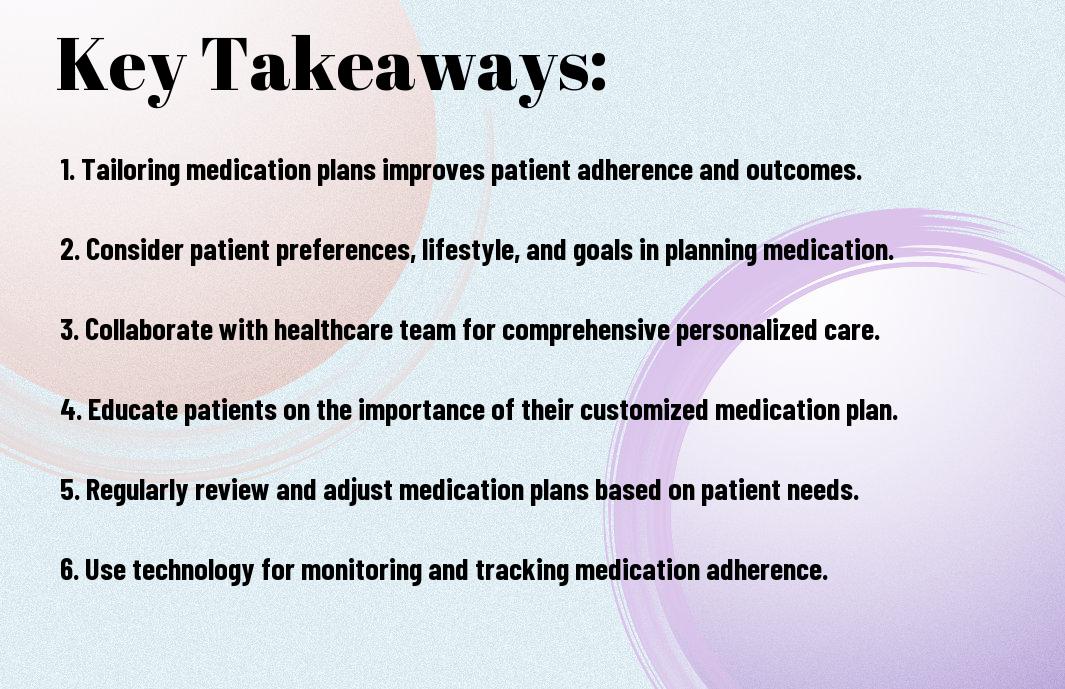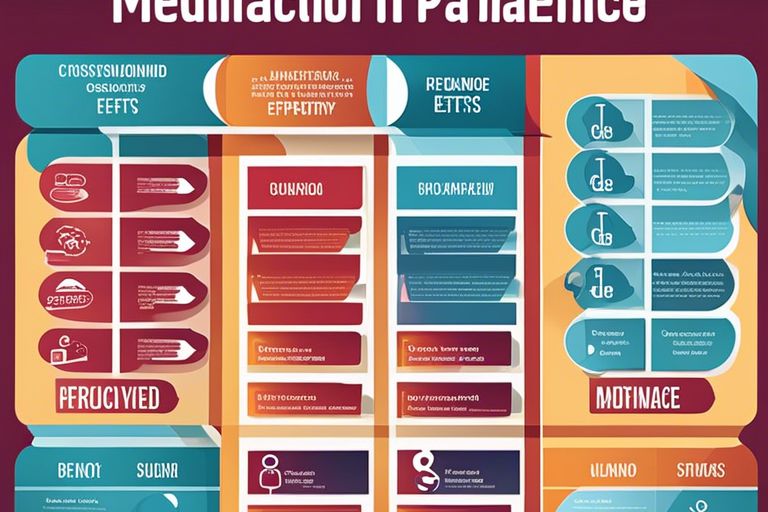
Just like Florence Nightingale emphasized the importance of tailored care plans, creating personalized medication plans is crucial for effective home care. This informative post will guide healthcare professionals and caregivers on the significance of customizing medication regimens to optimize health outcomes and enhance patient well-being. By understanding the individual needs and preferences of each patient, we can ensure safe and effective medication management at home.
Key Takeaways:
- Personalized Medication Plans: Tailoring medication plans to individual needs can improve patient outcomes and adherence.
- Home Care Focus: Providing personalized medication plans for home care patients can enhance their overall well-being and quality of life.
- Better Communication: Effective communication between healthcare providers, patients, and caregivers is necessary for implementing and monitoring personalized medication plans successfully in a home care setting.

The Importance of Personalized Medication Plans
A personalized medication plan is crucial for individuals receiving home care as it ensures that their specific health needs are met effectively. By tailoring medication regimens according to a patient’s unique medical history, conditions, and preferences, healthcare providers can significantly reduce the risk of medication errors and improve overall patient outcomes.
Reducing Medication Errors
The implementation of personalized medication plans plays a crucial role in reducing medication errors, such as incorrect dosages, drug interactions, or missed doses. By customizing medication regimens based on individual factors, healthcare providers can help prevent potentially dangerous situations and ensure that patients receive the right medications at the right time.
Improving Patient Outcomes
For individuals receiving home care, personalized medication plans are important for promoting better health outcomes and quality of life. When medications are tailored to suit a patient’s specific needs, it can lead to improved symptom management, better treatment adherence, and reduced hospital readmissions. Patients are more likely to experience positive results and enhanced well-being when their medications are personalized to address their unique health challenges.
It is important for healthcare providers to work closely with patients and their families to develop personalized medication plans that take into account individual preferences, lifestyles, and medical histories. By utilizing a patient-centered approach to medication management, healthcare professionals can ensure that individuals receiving home care receive the best possible treatment outcomes and experience an improved quality of life.
Assessing Patient Needs
Medical History and Current Health Status
History has shown that understanding a patient’s medical history and current health status is vital in creating personalized medication plans for better home care. By delving into past illnesses, surgeries, allergies, and current health conditions, healthcare professionals can gain valuable insights into the patient’s health needs.
Additionally, assessing vital signs, lab results, and current medications can help paint a comprehensive picture of the patient’s overall health status, allowing for tailored medication regimens.
Lifestyle and Daily Habits
Medical professionals must also consider a patient’s lifestyle and daily habits when creating personalized medication plans. Factors such as diet, exercise routine, and smoking or drinking habits can significantly impact medication effectiveness and overall health outcomes.
This holistic approach enables healthcare providers to offer personalized recommendations that align with the patient’s lifestyle, promoting better adherence to the medication regimen and improving treatment outcomes.
Medication Regimen Complexity
Medication complexity plays a crucial role in determining the success of a personalized medication plan. Health professionals must assess the number of medications, dosing frequency, and any special instructions to ensure optimal adherence and effectiveness.
By simplifying the medication regimen and providing clear instructions, patients are more likely to follow the prescribed plan consistently, leading to improved health outcomes and quality of life.
Creating a Personalized Medication Plan
Many factors need to be considered when creating a personalized medication plan for better home care. Setting realistic goals and objectives is crucial in ensuring the success of the treatment.
Setting Realistic Goals and Objectives
Goals should be specific, measurable, achievable, relevant, and time-bound. For example, if the goal is to reduce blood pressure, the objective could be to decrease it by 10 points within three months. This approach helps track progress and adjust the plan as needed.
Identifying Potential Medication Interactions
To ensure the safety and effectiveness of the medication plan, it is important to identify any potential interactions between different medications. This can help prevent harmful side effects and ensure that each medication is working optimally.
The identification of potential medication interactions is vital in preventing adverse reactions that could harm the individual. By considering the patient’s complete medication history and consulting with healthcare providers, a comprehensive understanding of potential interactions can be obtained.
Developing a Medication Schedule
Creating a detailed medication schedule is key to managing multiple medications effectively. It helps avoid missed doses and ensures that each medication is taken at the right time. Consider factors such as meal times, activities, and other medications to create a realistic and manageable schedule.
Understanding the importance of adhering to the medication schedule is crucial for successful treatment outcomes. By following a structured plan, patients can maximize the benefits of their medications and avoid potential complications.
Incorporating Patient Preferences and Values
Not every patient is the same, which is why it is necessary to consider their unique preferences and values when creating personalized medication plans for home care. By taking into account what matters most to the patient, healthcare professionals can tailor their treatment plans to align with their beliefs, lifestyle, and goals. To learn more about how to improve personalized home care plans, visit How to Improve Personalized Home Care Plans.
Cultural and Religious Considerations
Considerations should be made for cultural and religious beliefs that may impact a patient’s medication plan. It is crucial to understand any specific practices, dietary restrictions, or rituals that could influence medication adherence or effectiveness. Healthcare providers should engage in open communication with patients to ensure their cultural and religious needs are respected and integrated into their care plans.
Patient Education and Empowerment
Any personalized medication plan should include a strong emphasis on patient education and empowerment. Patients must have a clear understanding of their medications, including dosages, frequencies, and potential side effects. Education empowers patients to take an active role in their care, leading to better adherence and health outcomes.
This empowerment can involve providing patients with resources, such as medication charts, pill organizers, and educational materials. Encouraging patients to ask questions and express any concerns fosters a collaborative relationship between healthcare providers and patients, enhancing the overall quality of care.
Family and Caregiver Involvement
Education on the medication plan should extend to family members or caregivers involved in the patient’s care. Involving loved ones in the medication management process can provide additional support and reinforcement for the patient. Family members can help monitor medication adherence, recognize any adverse reactions, and assist in organizing medications.
The involvement of family and caregivers can also help bridge any communication gaps between the patient and healthcare providers, ensuring that everyone is working together towards the patient’s well-being. Collaboration among all parties involved can lead to a more holistic and effective approach to home care.

Overcoming Common Challenges
Managing Polypharmacy
For many patients receiving home care, managing polypharmacy can be a significant challenge. With multiple medications to keep track of, the risk of drug interactions and adverse effects can be higher. To overcome this challenge, it is vital to create a comprehensive medication list that includes all prescription and over-the-counter medications, as well as any supplements the patient may be taking. Working closely with a healthcare provider to review and streamline the medication regimen can help reduce the risk of polypharmacy-related issues.
Addressing Adherence Issues
To address adherence issues in home care settings, it is crucial to involve the patient in their care plan. Providing education about the importance of medication adherence and discussing any concerns or barriers the patient may have can help improve compliance. Additionally, utilizing tools such as medication calendars, pill organizers, or medication reminder apps can aid in keeping track of doses and schedules.
Patients may struggle with adherence for various reasons, including forgetfulness, confusion about medications, or financial constraints. By addressing these underlying issues and providing appropriate support, healthcare providers can help patients better adhere to their medication regimens, leading to improved health outcomes.
Managing Coordinating with Healthcare Providers
Managing coordination with healthcare providers can be challenging in home care settings. Patients may see multiple providers, leading to fragmented care and communication gaps. To address this challenge, establishing open lines of communication between all healthcare team members is vital. This can involve regular check-ins, sharing updated medication lists, and ensuring that all providers are aware of any changes in the patient’s condition or medications.
Common challenges in coordinating with healthcare providers include conflicting treatment plans, medication duplication, and inconsistent monitoring of the patient’s progress. By promoting collaboration and information sharing among all providers involved in the patient’s care, healthcare professionals can ensure a more cohesive and effective approach to medication management.

Implementing and Monitoring the Plan
Creating a Home Care Environment
All healthcare professionals and caregivers involved in implementing personalized medication plans understand the importance of creating a conducive home care environment. For optimal adherence and effectiveness of the medication plan, it is crucial to ensure that the surroundings support the individual’s routine and specific healthcare needs. This can include organizing medication in a visible and accessible manner, maintaining cleanliness to prevent contamination, and promoting a peaceful atmosphere to reduce stress levels.
Scheduling Regular Check-Ins and Follow-Ups
Environment plays a vital role in the successful implementation of personalized medication plans. In addition to creating a suitable space, scheduling regular check-ins and follow-ups with the individual is key. These appointments provide an opportunity to assess the patient’s progress, address any concerns or side effects, and make any necessary adjustments to the plan. By staying connected and monitoring the individual’s response to the medications, caregivers can intervene promptly if needed.
For instance, establishing a monthly check-in via telehealth or in-person consultation can help track the patient’s adherence and response to the medications. This proactive approach enables healthcare professionals to identify any issues early on and offer support or modifications to enhance the effectiveness of the treatment plan.
Adjusting the Plan as Needed
On the journey of personalized medication plans, it is necessary to remain adaptable and open to adjustments. Each individual responds uniquely to medications, and their needs may evolve over time. Careful monitoring and communication between healthcare providers, caregivers, and the individual can help in recognizing when modifications to the plan are necessary. By promptly addressing changes in the patient’s condition or response to treatment, the effectiveness of the medication plan can be optimized for better outcomes.
Summing up
Hence, creating personalized medication plans for better home care is crucial in ensuring the well-being and safety of patients. By tailoring medication regimens to meet individual needs and circumstances, healthcare professionals can help optimize treatment outcomes and improve overall quality of life for those receiving care at home.
FAQ
Q: Why is creating personalized medication plans crucial for better home care?
A: Personalized medication plans ensure that individuals receive tailored treatment that meets their specific needs, ultimately leading to more effective care and better health outcomes.
Q: How can healthcare professionals create personalized medication plans?
A: Healthcare professionals can create personalized medication plans by conducting thorough assessments of the individual’s medical history, current health status, and any medication allergies or interactions.
Q: What are the benefits of personalized medication plans in home care settings?
A: Personalized medication plans in home care settings can help reduce medication errors, improve medication adherence, and enhance overall quality of care for individuals.
Q: How do personalized medication plans promote patient safety?
A: Personalized medication plans promote patient safety by ensuring that individuals receive the right medications in the correct dosages, minimizing the risk of adverse drug reactions or complications.
Q: What role do caregivers play in implementing personalized medication plans?
A: Caregivers play a crucial role in implementing personalized medication plans by helping individuals adhere to their medication schedules, monitoring for any side effects, and communicating with healthcare professionals about any changes in the individual’s condition.
Q: How can technology support the creation and maintenance of personalized medication plans?
A: Technology can support the creation and maintenance of personalized medication plans by providing tools for medication management, reminders for dosing schedules, and alerts for potential drug interactions.
Q: What are some challenges in implementing personalized medication plans for better home care?
A: Some challenges in implementing personalized medication plans include the need for effective communication among healthcare team members, addressing individual preferences and cultural considerations, and ensuring that medication plans are regularly reviewed and updated as needed.


No Comments